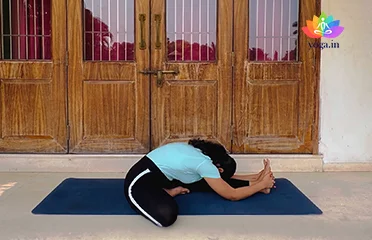Hastapadasana (Hand to Foot Pose)
हस्तपदासन / Hand to Foot Pose
The sanskrit name is derived from hasta (हस्त) means hands, pada (पदा) [�K]
Janusirsasana (Head to Knee Pose)
जानुशीर्षासन / Head to Knee Pose
The Sanskrit name is derived from (जानु) Janu means knee, Sirsa (शीर्षा) [�K]
Kraunchasana (Heron Pose)
क्रौञ्चासन / Heron Pose
The Sanskrit name is derived from Kraunch (क्रौञ्च) meaning heron [�K]
Matsyasana (Fish Pose)
मत्स्यासनI / Fish Pose
The Sanskrit name is derived from Matsya (मत्स्या) meaning fish [�K]
How Yoga Can Help Cure Tumour of the Stomach:
Stomach tumours are abnormal growths in the stomach that can be benign (non-cancerous) or malignant (cancerous). Yoga can aid in the treatment and relief of stomach tumors by enhancing physical and mental well-being. Through specific postures, breathing exercises, and relaxation techniques, yoga can improve digestion, reduce stress, and boost the immune system, helping the body to cope better with the disease.
Understanding Tumour of the Stomach:
Stomach tumors, or gastric tumors, are growths that form in the lining of the stomach. They can be benign, such as polyps and leiomyomas, or malignant, such as adenocarcinomas, lymphomas, and gastrointestinal stromal tumors (GISTs). These tumours can disrupt normal stomach function and cause various symptoms depending on their size and location.
Yoga’s Role in Relieving Tumour of the Stomach:
Yoga can alleviate symptoms of stomach tumor through gentle asanas (postures) that support digestive health, pranayama (breathing exercises) that enhance oxygenation and reduce stress, and meditation techniques that promote mental clarity and emotional balance.
Key Factors Contributing to Tumour of the Stomach:
Several factors can contribute to the development of stomach tumors, including:
- Genetic Predisposition: Family history of stomach tumor increases risk.
- Dietary Factors: High intake of smoked, salted, or pickled foods.
- Helicobacter Pylori Infection: A bacterial infection that can cause chronic inflammation.
- Chronic Gastritis: Long-term inflammation of the stomach lining.
- Smoking and Alcohol: Both can damage the stomach lining and increase cancer risk.
- Previous Stomach Surgery: Alterations in stomach structure can lead to tumor formation.
Symptoms of Tumour of the Stomach:
Common symptoms of stomach tumors include:
- Abdominal Pain: Persistent pain or discomfort in the stomach area.
- Nausea and Vomiting: Frequent feelings of nausea or episodes of vomiting.
- Bloating: Feeling of fullness or bloating after eating small amounts.
- Loss of Appetite: Reduced desire to eat, leading to weight loss.
- Fatigue: Persistent tiredness and lack of energy.
- Difficulty Swallowing: Trouble swallowing, often due to tumor growth blocking the stomach.
- Black or Bloody Stools: Indicating potential internal bleeding from the stomach.
Treatment of Tumour of the Stomach through Yoga and Pranayama:
Yoga and pranayama can be beneficial in managing stomach tumors. Effective practices include:
Specific Yoga Poses:
- Paschimottanasana (Seated Forward Bend): Enhances digestion and calms the mind.
- Vajrasana (Thunderbolt Pose): Promotes digestion when practiced after meals.
Pranayama Exercises:
- Kapalabhati (Skull Shining Breath): Stimulates abdominal organs and improves digestion.
- Nadi Shodhana (Channel-Cleaning Breath): Balances the body and reduces stress.
Diet for Tumour of the Stomach:
A balanced diet can help manage stomach tumors. Recommendations include:
- Fresh Fruits and Vegetables: High in antioxidants and fiber.
- Lean Proteins: Chicken, fish, beans, and legumes.
- Whole Grains: Brown rice, whole wheat, and oats.
- Probiotic-Rich Foods: Yogurt, kefir, and fermented foods.
- Hydration: Drink plenty of water to stay hydrated.
Caution for Tumour of the Stomach:
While practicing yoga for stomach tumors, it is essential to:
- Avoid Overexertion: Practice at a gentle pace to prevent strain.
- Listen to Your Body: Stop immediately if any pose causes discomfort or pain.
Contraindications for Tumour of the Stomach:
Individuals with stomach tumour should:
- Avoid Intense Yoga Practices: Vigorous exercises might exacerbate symptoms.
- Steer Clear of Certain Poses: Inversions and poses that compress the abdomen may increase discomfort.
- Seek Professional Guidance: Consult a yoga therapist or healthcare professional for personalized recommendations.





